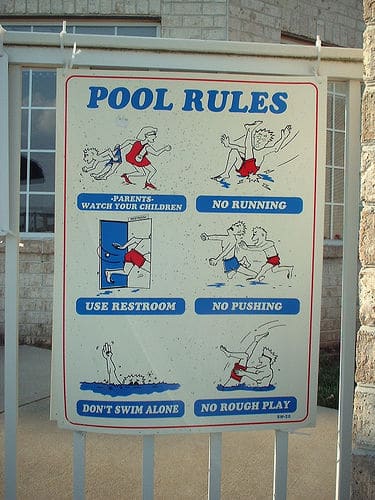Do you remember the first time you were in the deep end of a swimming pool?

Maybe you ventured into the deep end on your own, or maybe you were tossed in by a prankster (or well-meaning adult), but chances are that your first experience with deep water was a little scary. In terms of personal safety, how you are able to handle yourself in deep water is the baseline for water safety skills, according to the American Red Cross.
Now that warm weather is finally upon us and area pools will be opening soon, it’s a good time to talk about swimming and water safety. Whether you enjoy floating in a pool, fishing on the lake, or skiing in the river, practicing basic water safety can help make your summer more pleasurable.
Basic Swimming Skills
The purpose of basic swimming skills is to get you out of a dangerous situation in the water. Drowning is a quiet killer – it’s not like it’s depicted in the movies.
Every day, ten people lose their lives to drowning, and two of those ten are children. In truth, more than half of Americans cannot swim well enough to save themselves. For African-Americans and Latino/Hispanic children, the numbers are even more frightening: up to 70% of African-American and 58% of Hispanic children cannot swim. And children who cannot swim often become adults who cannot swim.
According to a Red Cross poll, 80% of adults claim to be able to swim, and yet 44% of them would fail a basic swimming test. That basic swimming test includes:
- Stepping or jumping into water over your head
- Returning to the surface and float or tread water for one minute
- Turning around in a full circle
- Swimming 25 yards (the length of a standard swimming pool)
- Exiting from the water without using a ladder
This is what is known as “water competency” and this very basic level of ability could mean the difference between surviving and drowning.
General Water Safety
Spending time on and in the water is regarded as one of life’s greatest pleasures. In order to make this experience the best it can be, the American Red Cross has compiled a list of general water safety tips:
- Learn to swim
- Never swim alone – always swim with a buddy
- Swim in areas supervised by a lifeguard
- Obey all rules and posted signs
- Children and inexperienced swimmers should use a U.S. Coast Guard-approved personal flotation device in and around the water – foam pool noodles and armband-style “floaties” do not count
- Do not swim if you are too tired, too cold, too far from safety, had too much sun, or too much strenuous activity
- Establish water safety rules for the whole family based on the swimming ability of each individual
- Understand the water environment you are in – deep and shallow areas, currents, and entry and exit points
- Keep an eye on the weather – storms are common in the summer and can pose danger for swimmers
- Enter the water feet first
- Head-first diving should only occur in areas marked for that purpose
- Do not drink alcohol – alcohol impairs judgment, balance, and coordination, and affects your swimming and diving skills
- Keep a watchful eye for emergencies, and know how to respond – knowing what to do to help a person in trouble as well as learning basic lifesaving techniques like CPR is invaluable
A Word About Lifeguards
You may think that just because you are swimming in a pool that has lifeguards that you don’t need even basic swimming skills. While lifeguards are tasked with keeping a watchful eye on the swimmers in their charge and have been trained in basic lifesaving skills, the truth is, lifeguards are the last line of defense against drowning.Your best defense is to learn to swim.
Learning to swim is a confidence builder and, potentially, a life saver – and it’s never too late to learn. At Gerling Law, we hope everyone will learn and follow water safety rules, and have a fun, safe summer.

